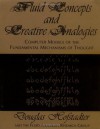251
Followers
4
Following
Manny Rayner's book reviews
I love reviewing books - have been doing it at Goodreads, but considering moving here.
Currently reading
The Greatest Show On Earth: The Evidence For Evolution
R in Action
Fluid Concepts and Creative Analogies
McGee on Food and Cooking: An Encyclopedia of Kitchen Science, History and Culture
Epistemic Dimensions of Personhood
Pattern Recognition and Machine Learning (Information Science and Statistics)
Relativity, Thermodynamics and Cosmology
The Cambridge Handbook of Second Language Acquisition
 As you can see if you read the other reviews, there are a lot of ways to approach Naming and Necessity, and some of them get into very technical philosophical territory. Those ways of reading it are interesting, but I think that what Kripke is saying is, in the end, quite simple, which is why the book has enjoyed such lasting popularity. He just had to express much of the argument in terms of the language of "possible worlds", which was fashionable at the time.
As you can see if you read the other reviews, there are a lot of ways to approach Naming and Necessity, and some of them get into very technical philosophical territory. Those ways of reading it are interesting, but I think that what Kripke is saying is, in the end, quite simple, which is why the book has enjoyed such lasting popularity. He just had to express much of the argument in terms of the language of "possible worlds", which was fashionable at the time.Kripke's basic point, to me, is rather more general than technicalities about modal logic and possible worlds. He wants to know what "names" are, and how they refer to the world. There was an influential school of thought which held that a name is really a kind of description, and should be thought of in those terms; you know what the name refers to by understanding the description and figuring out who it names. Thus, for example, the expression "Barack Obama" is semantically similar to the expression "the current President of the United States". Kripke disagrees with this. He argues persuasively that names refer to things by virtue of causal processes in the world. There is a causal chain that leads from the object to the name, and which carried reference. Names do not have to be descriptions for this to work.
So, for example, suppose you're having a discussion about Obama with a friend in front of their three year old child, and you've just said you're disappointed that Obama hasn't closed Guantanamo. The child, who's never heard of Obama, can legitimately interrupt and ask if Obama is a nice man, and still be referring to him, which to me is the common-sense view. The causal chain led up to me, and now it's just been extended another step. It doesn't matter that the child only has the haziest notion of who it is I'm talking about.
When Kripke wrote the book, computers were not as important as they are now, and there was no Internet. It occurs to me to wonder if this isn't a case where adopting the perspective of the machine gives you a new way to think about what's going on. The Web is full of names; many of them refer to something in the world. How do they do this? Suppose we're looking at a table on a web page, we see a name, and we wonder what it refers to. Even if the table has been automatically generated, it is often perfectly clear what the name's reference is because of the way the page connects to the world. I click on the name "London", and something happens: maybe I see a map of London, Ontario, or I buy a ticket to London, England, or I get a list of books by Jack London. Reference is derived from a causal relationship mediated through the Web.
Or at least, that was the argument I had in mind when I started writing this review. But now it occurs to me that you can maybe twist it in the opposite direction. We all know the difference between a plain name and a clickable one, and the reason is that the name's much longer than it looks; it's really a camouflaged description.
Damn philosophical questions! You never get a straight answer. For a moment, I thought I had something there.











